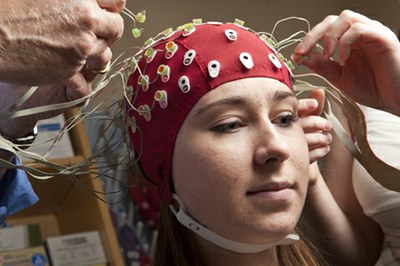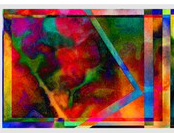Ron Mangun: Attention to Training New Generation of Neuroscientists
An expert on visual attention and perception in humans, Mangun initially joined the UC Davis psychology faculty as part of the founding of the campus Center for Neuroscience. During his first stint here, he also helped launch the international Cognitive Neuroscience Society.
Then, in 1998, Duke University offered him an opportunity to build a cognitive neuroscience center there. Although deeply torn over leaving UC Davis, he said, “It was just too exciting of a job to turn down.” So he went to Durham, North Carolina, to establish Duke’s cognitive neuroscience center and graduate program.
Seeing his success there, UC Davis asked him in 2002 to come back to campus and build the Center for Mind and Brain. Part of a campuswide initiative, the center has since grown to 21 faculty laboratories plus shared facilities for research across the spectrum of mind and brain science.
“I came to Davis originally because it was investing in new interdisciplinary science,” Mangun said. “And I returned for the same reason, but also because I believe in the UC mission.”
After directing the Center for Mind and Brain for seven years, Mangun was tapped to help advance the three prongs of that mission—teaching, research and public service—elsewhere on campus.
From 2008 to 2015, he served as the dean of the Division of Social Sciences, which includes more than 240 faculty members, 10 departments, three research centers, and eight interdisciplinary programs. The Division of Social Sciences also educates more than 6,000 undergraduate students, more than any other school or college on campus.
He is now the director of Kavli Summer Institute in Cognitive Neuroscience, established in 1988 to develop the next generation of brain scientists. He also jumped in as interim chair of the Department of Psychology for 2016–17.
“Ron has done more than anyone I know to make UC Davis the world-class university it is today,” said colleague Steven Luck, professor of psychology and the current director of the Center for Mind and Brain.
“He’s a cutting-edge scientist, a great teacher and textbook author, and a builder of centers and institutes,” Luck said. “Ron takes great pleasure in helping others achieve their goals, and he has selflessly helped countless students, staff, and faculty over the years.”
Cutting-Edge Researcher
 The cognitive neuroscience revolution was just beginning when Mangun started his career as a scientist at UC San Diego. As a young assistant research neuroscientist in the late 1980s, Mangun began his study of visual attention and perception in humans using neuroscience tools. Curious about how we become aware of events in our environment, he was able to identify some of the brain mechanisms of how we are able to pay attention and avoid distraction.
The cognitive neuroscience revolution was just beginning when Mangun started his career as a scientist at UC San Diego. As a young assistant research neuroscientist in the late 1980s, Mangun began his study of visual attention and perception in humans using neuroscience tools. Curious about how we become aware of events in our environment, he was able to identify some of the brain mechanisms of how we are able to pay attention and avoid distraction.
During the 1990s, he became known internationally for his efforts to provide better measures of human brain function by combining different neuroscience tools, such as brain wave recording (EEG) and brain imaging (fMRI).
His research contributions—which advance our understanding of attention disorders associated with neurological and psychiatric diseases—have earned him numerous awards and honors, including his designation as distinguished professor of psychology and neurology.
Dedicated Teacher
Professor Mangun is committed to training the next generation of neuroscientists. With colleagues at UC Berkeley and UC Santa Barbara, he wrote "Cognitive Neuroscience: The Biology of the Mind." The first textbook in the field, "Cognitive Neuroscience" is now in its fourth edition and has been translated into French, Italian, Portuguese, and Chinese.
An undergraduate course “Cognitive Neuroscience,” which he launched nearly 20 years ago, is offered every quarter at UC Davis—helping students answer the question, “how does the brain produce the mind?”
Students say that Mangun remains helpful and accessible despite his busy schedule. “He is warm, funny, understanding, experienced, professional and passionate,” one student noted.
While passionate about his research, Mangun says teaching the next generation is “one of the highest honors and responsibilities a scholar can have. After all, what can be more important than advancing human knowledge by helping to create the next generation of researchers and thinkers? I look forward to seeing how today’s students will develop new theories, tools, and answers to the question of how the brain works."
— by Aman Dhillon, Science Writing Intern
(Kathleen Holder, who writes about the social sciences for the UC Davis College of Letters and Science, contributed to this report.)

